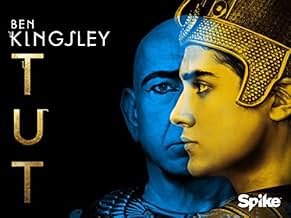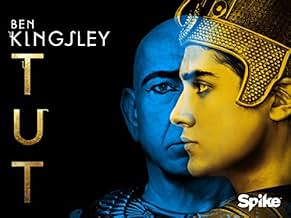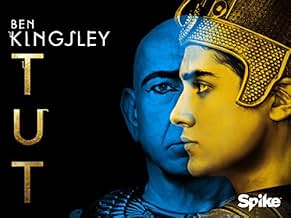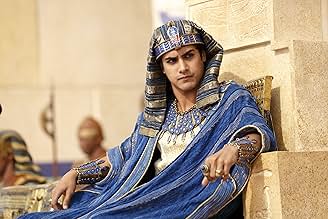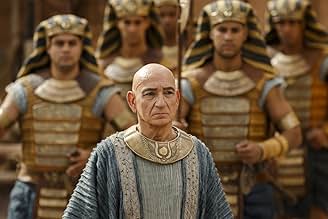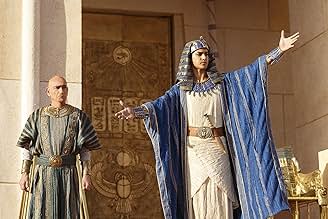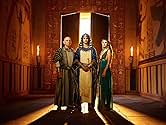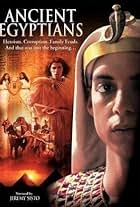A largely fictional mini-series based on a legendary teenage Pharaoh of Ancient Egypt.A largely fictional mini-series based on a legendary teenage Pharaoh of Ancient Egypt.A largely fictional mini-series based on a legendary teenage Pharaoh of Ancient Egypt.
- Awards
- 5 nominations total
Browse episodes
Featured reviews
This show was a total and pleasant surprise. I would of loved to see it have a chance to developed more but all and all a very good show. People dogging this show lose sight that is TV show not a documentary full of facts and figures. The show served it's purpose of providing drama and a very good story. From a production stand point I thought it was outstanding. Actors and actresses who I've never heard of had a chance to shine and for the most part did a very respectable job. As with most TV drama there are going to parts that could of hit the editorial floor but for Spike TV to feature a show off this magnitude I thought it was well done and definitely worth watching!
I read several of the reviews to see anyone said what I was gonna say and didn't look like it so far so here goes.
I noticed that allot of people really liked the show, I also thought it was pretty good, but I got the idea the reason for that is, that it's actually Hamlet from Shakespeare with an Egyptian outfit. For those who don't know Hamlet, The Lion King was also the story of Hamlet. Try to see if you find any similarities. You will find many.
I did enjoy watching it but I was hoping for a series about ancient Egypt, but except for looking Egyptian it had nothing to do with ancient Egypt so that's why I'm a bit disappointed. There is very little known about Tutankhamen but a few things they do know like who is parents where Ikhnaton and his sister who's name is unknown. they introduced Monotheism during there rule. When Tut became Pharaoh the old gods where reintroduced, probably the clergy took advantage of the young naive pharaoh but none know's, would have been nice if at least there was something about that in the series.
I noticed that allot of people really liked the show, I also thought it was pretty good, but I got the idea the reason for that is, that it's actually Hamlet from Shakespeare with an Egyptian outfit. For those who don't know Hamlet, The Lion King was also the story of Hamlet. Try to see if you find any similarities. You will find many.
I did enjoy watching it but I was hoping for a series about ancient Egypt, but except for looking Egyptian it had nothing to do with ancient Egypt so that's why I'm a bit disappointed. There is very little known about Tutankhamen but a few things they do know like who is parents where Ikhnaton and his sister who's name is unknown. they introduced Monotheism during there rule. When Tut became Pharaoh the old gods where reintroduced, probably the clergy took advantage of the young naive pharaoh but none know's, would have been nice if at least there was something about that in the series.
Loved the costumes, actors, and most of all the Pharaoh they chose! I liked the drama set up! I haven't been exited about a show in a while and this one is entertaining. I found the relationships with his high priest and his general similar to what goes on in politics today. I wish it was a series not a mini series as I'm loving the content. It is definitely not appropriate for kids though. I liked how there was a mixture of hate and anger linked to the pharaoh by everyone around him. You can never hold the spotlight too long because everybody wants it. I feel that is very humanly behavior being portrayed in these series of "Tut". I want to see the king in television more often he brightened my night.
Personally, and although I like to watch it, I have a lot of itchiness with films and TV series based on historical material. They usually end up having so little rigor in the way they show the past and the real historical characters that they become worthy of my hatred or my disdain, as a historian. This series is another one, with an aggravating tone: we don't know as much as we wanted about Tutankhamun's life. In fact, as far as we know, Tutankhamun is one of the most unlit pharaohs of the dynasty to which he belonged. The story of his father, Akhenaten, is much more interesting in that he led a serious religious conflict in the heart of Egypt, a country where Pharaoh was also head of the state religion. However, it is not possible to escape the fascination that this young king has on us. He is, with his funerary mask, the face of Ancient Egypt.
The real Pharaoh Tut was born out of an incestuous union and began to reign around the age of ten. He married a half sister, with whom he had two daughters who did not survive childhood. The series addresses the problem of succession, but refers very briefly to these births and treats them as simple abortions. The series also takes the opportunity to create around the Pharaoh a web of intrigues and conspiracies involving the vizier Ay, who was head of the government, and the general commander of the army, General Horemheb. Both characters existed and came to reign, successively. One of the most wrong points of the series, from the point of life of historical rigor, concerns the Mitanni. The series portrays this kingdom in a way that, despite never placing it on the world map, seems to place it in present-day Sudan, reasonably close to Egypt for the characters to travel in just a few days' journey. The reality is, however, very different: the Mitanni kingdom was one of the Hurrian kingdoms and was located more or less in today's Kurdistan, far enough from the Egyptian capital to never represent a threat! Even more striking is the wrong way in which Tutankhamun himself is portrayed. In addition to his reasonably European features and white complexion, the pharaoh is shown to be a healthy person, even athletic and able to fight. In fact, and based on the analysis of his mummy, we know that Tutankhamun was fragile and would have had difficulty walking because he suffered from a mild form of scoliosis and a deformed foot. So forget the warrior pharaoh!
Now that we have seen how this series was able to run over history, the question remains: was it worth it? In fact, the series entertains, works well as an entertainment piece despite deceiving people and giving the wrong idea to Pharaoh! Reasonably well done and with an excellent cast, the series is decent.
The cast is strongly based on the performances of two specific actors: Avan Jogia and veteran Ben Kingsley. Both were effective in their work and knew how to act effectively, especially Kingsley, who gave Ay a Machiavellian aura. We also have the good performance of Kylie Bunbury, who gave life to the most emotional character and able to reach the public. Also admirable and praiseworthy were the efforts of Nonso Anozie and Iddo Goldberg. Sibylla Deen gave us the most fragile interpretation, but it was still quite convincing, especially in the scenes with the most dramatic load.
Technically, it is a series of average quality. Cinematography is quite good considering the TV quality that the series exudes. Using and abusing CGI and the green screen that everything makes possible, it was possible to recreate Egypt without great costs, although losing that pleasant feeling of realism. The royal palace with those overlapping floors, for example, is too fanciful to be credible and there are more problems of logic and lack of credibility to arise everywhere. This is the case of Egyptian military armor, clearly invented without the support of archeology, and having as its objective only and only the aesthetic criterion of production. The soundtrack is good, but of TV quality.
The real Pharaoh Tut was born out of an incestuous union and began to reign around the age of ten. He married a half sister, with whom he had two daughters who did not survive childhood. The series addresses the problem of succession, but refers very briefly to these births and treats them as simple abortions. The series also takes the opportunity to create around the Pharaoh a web of intrigues and conspiracies involving the vizier Ay, who was head of the government, and the general commander of the army, General Horemheb. Both characters existed and came to reign, successively. One of the most wrong points of the series, from the point of life of historical rigor, concerns the Mitanni. The series portrays this kingdom in a way that, despite never placing it on the world map, seems to place it in present-day Sudan, reasonably close to Egypt for the characters to travel in just a few days' journey. The reality is, however, very different: the Mitanni kingdom was one of the Hurrian kingdoms and was located more or less in today's Kurdistan, far enough from the Egyptian capital to never represent a threat! Even more striking is the wrong way in which Tutankhamun himself is portrayed. In addition to his reasonably European features and white complexion, the pharaoh is shown to be a healthy person, even athletic and able to fight. In fact, and based on the analysis of his mummy, we know that Tutankhamun was fragile and would have had difficulty walking because he suffered from a mild form of scoliosis and a deformed foot. So forget the warrior pharaoh!
Now that we have seen how this series was able to run over history, the question remains: was it worth it? In fact, the series entertains, works well as an entertainment piece despite deceiving people and giving the wrong idea to Pharaoh! Reasonably well done and with an excellent cast, the series is decent.
The cast is strongly based on the performances of two specific actors: Avan Jogia and veteran Ben Kingsley. Both were effective in their work and knew how to act effectively, especially Kingsley, who gave Ay a Machiavellian aura. We also have the good performance of Kylie Bunbury, who gave life to the most emotional character and able to reach the public. Also admirable and praiseworthy were the efforts of Nonso Anozie and Iddo Goldberg. Sibylla Deen gave us the most fragile interpretation, but it was still quite convincing, especially in the scenes with the most dramatic load.
Technically, it is a series of average quality. Cinematography is quite good considering the TV quality that the series exudes. Using and abusing CGI and the green screen that everything makes possible, it was possible to recreate Egypt without great costs, although losing that pleasant feeling of realism. The royal palace with those overlapping floors, for example, is too fanciful to be credible and there are more problems of logic and lack of credibility to arise everywhere. This is the case of Egyptian military armor, clearly invented without the support of archeology, and having as its objective only and only the aesthetic criterion of production. The soundtrack is good, but of TV quality.
Very refreshing to watch such a well written series, wonderful actors, believable sets, and story line. Wonderful to see that there is still some quality movie making instead of some of the dribble that is being made these days.
Hated to see it end but hope more historical dramas will be forthcoming. Made me want to read more about King Tut and that period. Would definitely recommend this, well worth time spent watching.
Enjoyed actors, especially the young man who played King Tut. Ben Kingsley portrayal was realistic and both of the young women were beautiful and well played.
Hated to see it end but hope more historical dramas will be forthcoming. Made me want to read more about King Tut and that period. Would definitely recommend this, well worth time spent watching.
Enjoyed actors, especially the young man who played King Tut. Ben Kingsley portrayal was realistic and both of the young women were beautiful and well played.
Storyline
Did you know
- TriviaTut is believed to have died from complications following an accident that was consistent with being thrown from one chariot and being run over by another. He had serious injuries to his trunk and a compound fracture of one of his legs. MRI and CT analysis of his mummy shows the injury, which did not heal, indicating it was perimortem. DNA analysis also shows that he repeatedly suffered from the most severe type of malaria. There was coriander in his tomb, a spice used to treat fever during his time. Tut had a malformed bone in one of his feet, possibly genetic, that probably caused him to limp. He was buried with many canes that were used, as evidenced by wear. It is supposed that Tut was injured during a hunting expedition, possibly a chariot accident. Having been weakened by malaria, it is thought that he developed an infection from the broken bone and leg injury that overwhelmed him causing his death. It is possible he had internal injuries that contributed, however the hasty and poorly performed mummification process, which included a disproportunate amount of scented oils that caused decomposition. His organs, which were stored in canopic jars, were not able to provide any discernible evidence.
- GoofsTutankhamun did not directly succeed Akhenaten. There was at least one intermediate heir: Smenkhkare or Queen Neferneferuaten or perhaps both.
- How many seasons does Tut have?Powered by Alexa
Details
Contribute to this page
Suggest an edit or add missing content







